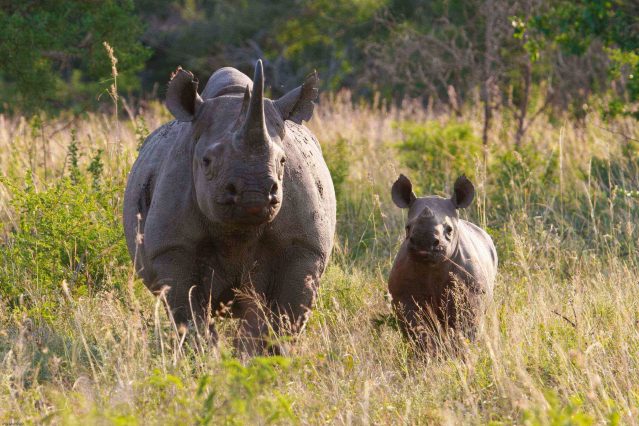South Africa has lost 231 rhinos to poaching since the beginning of the year. That’s according to the the Endangered Wildlife Trust.
As the world observe World Rhino Day on the 22nd of September annually, the Endangered Wildlife Trust believes there a need to continue to remind people about the dangers that Rhinos as endangered creatures continue to face and their desperate fight for survival.
Rhinos are poached for their horn, which is then sold in Asia to be used for a variety of reasons, including perceived aphrodisiac qualities.
According to the International Rhino Foundation, the estimated total global population of rhinos is now fewer than 27 000.
Since 2008, about 7 900 rhinos were poached for their horns in South Africa, which is home to about 80% of the world’s rhinos.
Senior Manager for the Business and Wildlife portfolios at the Endangered Wildlife Trust, Lourens Leeuwner says, “Since 2008, there has been a complete onslaught on the rhinos in SA. We have just over15 thousand rhinos. The poaching has declined slightly this year compared to the same period this year but its still very much an issue. You will find that in one reserve if the anti-poaching efforts are stepped up, they will just target another area. We also have these large areas to protect. If you think of Kruger National Park, it’s almost 2 million hectares.”
Threat to SA’s heritage
The Endangered Wildlife Trust says the onslaught on rhinos in South Africa is a threat to the country’s heritage.
Leeuwner says preserving these magnificent creatures is not only a matter of ecological importance but also crucial for the thriving wildlife tourism sector in the country.
“The poachers are sophisticated. This is a crime syndicate. This is not someone that wakes up one day and says, I’m going to poach a rhino. They have aircrafts, they can fly over properties, see where rhino are and take GPS locations. They infiltrate communities. Rhino’s are still being poached for the horn. The horn is very valuable. Depending on the horn, it can fetch about 60 thousand dollars per kg. A good white rhino, you can looking at about 5kg that can be harvested. It’s really an onslaught of our national heritage.”
Louwhen Bowker from the Care for Wild Rhino Sanctuary says, when a rhino is killed, an entire ecosystem is taken away.
“The biggest impact is that your rhino is umbrella species so there are a lot of small organism and other animals that depends on the rhino being in the area. So as soon as you lose your rhino, you lose all these other micriorganisms in the area as well. So the impact is not just losing one animal but several that is an issue here.”
Meanwhile, the Black Rhino Project – part of the World Wildlife Fund – this year celebrates 20 years of raising rhinos.
As part of the project – about 230 rhinos have been translocated to create 15 new black rhino populations on sites in South Africa and Malawi. More than 200 rhino calves have been born on project sites.
Wildlife vet Dr Jacques Flamand has led the project since inception.
“It’s been taking about 20 black rhinos a year and putting them on blocks of land and land owners have agreed to create by dropping fences between each other. Since we started, we have created 15 new populations this way. One went to a national park in Malawi but the rest are in SA. Our numbers have increased hugely. Yes we caught about 230 black rhinos to distribute to new populations but there are now 330 and that is despite poaching. My success feeling comes the number of rhinos increasing and contributing to the African population as a whole.”
Ongoing rhino poaching challenge with Dr Jacques Flamand:






